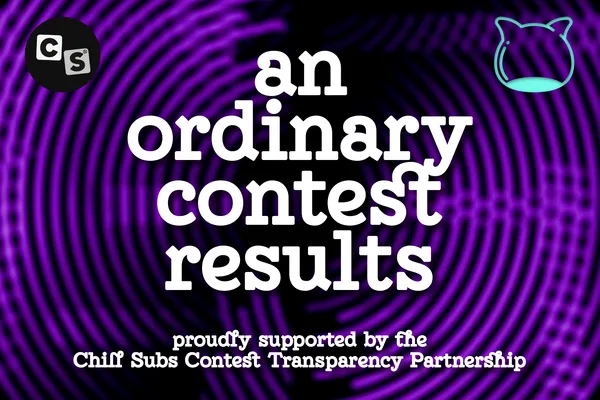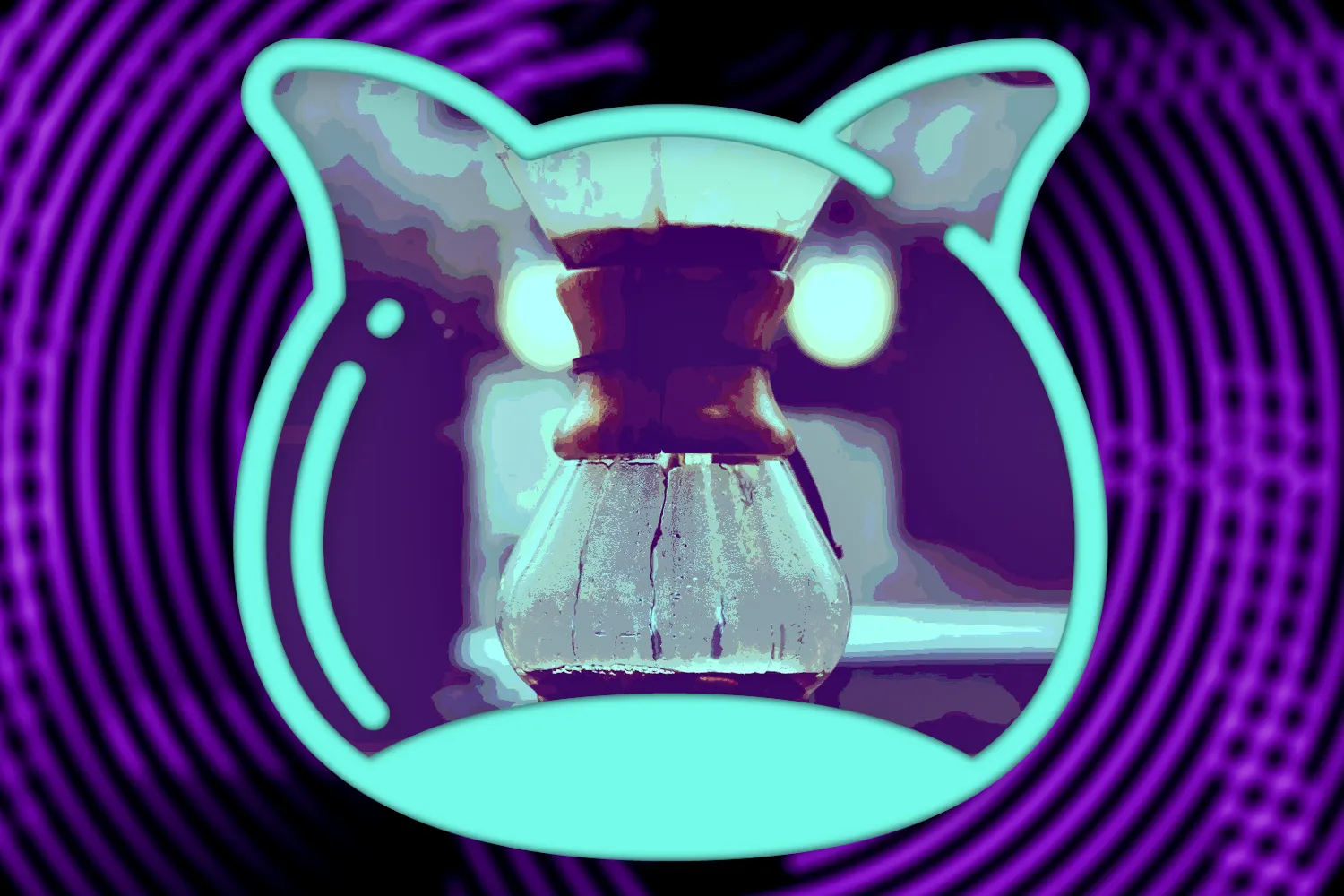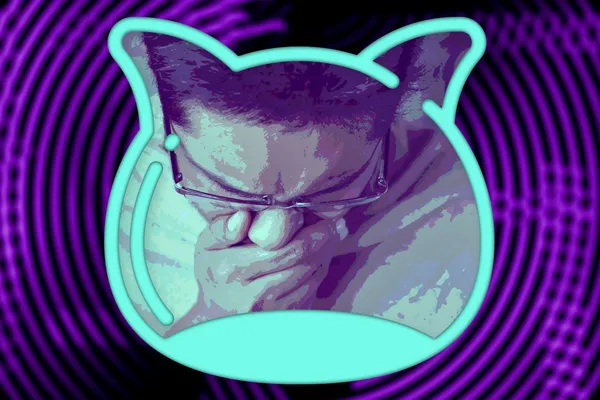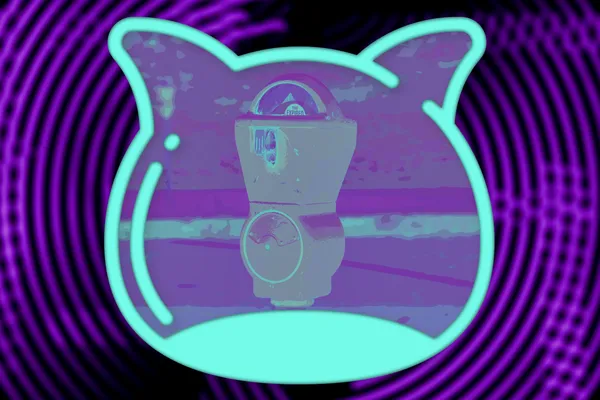
An ordinary contest results
truly extraordinary
by Andrea Cavedo

Exit, the punk bar on North Avenue—you know the one, just west of the overpass and the landfill beneath—that’s where we met. Well, that’s what we told people at parties, if they asked. It was a hardcore dive decorated with gas masks and motorcycle bodies, its exposed cinderblocks caked in asbestos and lime, its every surface a Hepatitis infection waiting to happen.
Dangerous.
Thrilling.
And it was a lie.
We met at the bus stop across the street.
I was waiting for the 72, my ears still ringing with Agnostic Front, eyes adjusting slowly under the purple-orange sodium glow of the streetlights. I didn’t see him walk up, or didn’t notice him already at the stop when I arrived. He just materialized out of the darkness. He wore black cowboy boots with evil-looking spurs, black leather pants and jacket, a black scarf that could have been the pelt of an unlucky goat, and sunglasses that were shiny and mirrored, but reflected only darkness. His head was shaved bare and gleaming like bone. While his face was drawn, there was a sensuousness to his mouth, to the way he quirked his lips when he asked me for a light. He was exactly my type.
He stood a respectful distance away from me and smoked leisurely and, after many empty minutes, asked if there was an Elston bus running.
“The 13,” he added.
“You mean the 41?”
He thought about that and then said, “What year is it?”
“What year do you think it is?” I asked.
He rubbed a black-gloved hand over his jutted chin and said, “It feels like 1968.”
That made me laugh. What a strange year to choose—the year I was born. He was always funny like that.
It was cold, one of those brutal January midnights in Chicago (early, by Exit’s standards), and the bus he was hoping for hadn’t been running for twenty years. We got to talking, then to walking—mostly to keep warm—first along the polluted north spur of the river, then under the roaring expressway. We ended up toe-to-toe on the sidewalk outside the Hollywood Grill. Hands jammed into pockets, shoulders hunched, conversation limping along one hopeful murmur at a time, neither of us quite prepared to let it die. Every time the diner’s door opened, we were bathed in a humid musk of hash browns and burnt grease, so strong as to be near-corporeal, like a finger curling out and beckoning inside. Like a voice crying “Come!” to my growling stomach. The pop tunes of the jukebox leaked out with the aroma of 24-hour breakfast. When the opening piano riff of “Closing Time” by Semisonic shimmered out to us, he interrupted himself mid-sentence.
“Demi,” he breathed, like he was telling me a secret. “I love this song.”
I laughed and took him by the elbow, which was sharp even through the creaking leather of his sleeve. “Come on then, there’s at least two verses to go.”
We sat at a formica-topped booth and listened to the singer’s plaintive wail: the old barkeep’s line about not having to go home but not being able to stay any longer, the line about knowing who you want to go home with. It seemed the song stretched on forever: past the waitress scribbling our orders with a late-night frown; past the eggs and toast and little packets of butter; past the corned beef and omelets and crepes and waffles. We talked and ate, each swipe of the napkin taking more black lipstick from my mouth, until the white paper came away clean.
Sometime around three in the morning, he ordered black coffee and shuddered at the end-of-shift sludge in his ceramic mug.
“I’ve been told I make a pretty good cup, if you want to get out of here,” I said, offhand, real casual, hardly daring to look at him for fear he might laugh at me, or worse, look serious and sad that I’d gotten the wrong impression.
But he said, “All right,” and paid the bill with cash he barely counted, and we were on our way.
It was still ten blocks to my apartment, and not even the buses were running at that point, but January never feels as cold with someone’s arm wrapped around you, or when your heart is hurrying, pumping hot expectation through your whole body.
In my apartment, he shrugged off his layers, dropped a set of keys and a small, wiry contraption on the kitchen table: dull brass, chains, and plates. An old-fashioned balance.
He plucked a pager from his belt, checked the display and said, “Can I use your phone?”
“Now?” The readout above the stove showed 4:17, sickly green in the low light.
“I need to call my answering service.”
I was impressed by that, I must admit. Most people I knew with pagers were dealers, or wannabes. There was something suave, something decadent about having access to a secretary who kept track of your calls no matter where you were.
“In the living room, on the table next to the couch.” I pointed down the hallway.
So as not to eavesdrop, I busied myself with the coffee. I knew I made a good cup, but I wanted this one to be extraordinary. I knocked aside Mr. Coffee, contemplated my French press, but finally settled on the Chemex in the very back of the cupboard. I hadn’t used it in ages; it was a gift from my mother, who didn’t really understand me, but knew I loved Bauhaus design and staying up late. The wood collar was faded from lack of care, and the leather thong looked nibbled on its ends. But it was special—and I had a feeling he was, too. I pulled it from its flimsy octagonal box and got to work.
He returned just as I was swirling the hot coffee around the bottom of the hourglass brewer, ready to pour. His face was stormy, pinched with irritation so that he looked more gaunt than he had in the diner. He accepted his mug with surprise, almost as if he’d forgotten why he’d come. He drank.
“This is good,” he said, as if the possibility had not crossed his mind when he’d accepted my offer. He took another sip.
“I know.” I tried not to sound too proud. “Coffee is my job. I own a shop down the block, Demi-Tasse.”
He took another sip, this time pausing to breathe in the oily perfume before letting it brush against his lips. “They used to call coffee the devil’s drink, but this—this is a cup to save the world.”
“Some people will tell you it’s all in the beans, and they are important. But it’s the ratio that really matters.”
“Is this how you make it in your shop?”
“I’m always in a rush there. Have to eyeball it.” I blushed, “I used your scales to measure out the perfect cup. I hope that’s okay...”
He stared over at the balance, which was lurking on the countertop like some piece of lost clockwork. I was sure, in that brief moment, that I’d ruined it all. That I’d crossed some unspoken line in my desire to please him.
“Never thought of using it for that,” he said finally. And smiled.
He stayed. That night, and the next, and the next. Each morning when I woke up, he would help me grind the beans and then watch—hungrily—as I measured each spoonful on his scales, adjusting it to the gram. He’d hold me close as the coffee brewed, and he always said, “Thank you, Demi,” for each cup I pressed into his long, thin hands.
It wasn’t a rigid tradition. We tried different roasts: dark, light, even decaf for a single unsatisfying morning before we laughed and took turns hurling the remaining beans into the alley dumpster from my kitchen window, each one cracking and pinging against the hollow metal like gunfire. I experimented with foamed milk, espresso shots, latte art; cafes au lait and cortados; flat whites and americanos. He said he drew the line at pumpkin spice, but I caught him late one night with his scales next to my spice rack, making notes about ground ginger and cloves.
And then one morning, on the eve of spring, he was gone.
I was 30 years old. Loneliness had made me lean and furious. It’s what drew me to bars like Exit, and to the kind of men who would wear sharp spurs. But over the months with him, I’d let my guard down. I’d stopped spending so much time hiding behind black eyeliner and metal rivets, and started learning more actively about my work: single-origin beans, the four stages of coffee’s alchemy. I had started—you must forgive me—listening to Semisonic with actual appreciation. I had gone gooey, like an underbaked loaf, a soft-boiled egg. So, even more than I was angry at him for leaving, I was angry with myself for believing he would stay. I let rage bury my shame. I would have ripped his scarf to shreds, or set fire to his leather jacket, but he’d left nothing behind. Not even the scales. I returned to my usual routine with laser-like focus: work, drink, sleep, repeat. Customers complained that their coffee was unaccountably bitter. “That’s just how it goes sometimes,” I said, and poured cup after cup down the drain.
That awful spring gave way to an obnoxiously green summer, which finally decayed into fall. One night when the cold had reasserted its iron grip on the city, I was waiting for another bus—in Lincoln Park this time, outside Neo. A carriage rattled by, drawn by a black horse. Swaybacked and matted, it looked as worn down as I felt, both of us cruelly shackled to fates we could not control, starving for attention. The driver pulled in close to the curb, so close I could see the rolling white of the horse’s eyes as it almost knocked into me. And there he was, on the coachman’s bench, his drawn face cracked in a wicked smile.
I was so shocked, I forgot about my rage.
“Is this why you left? You’re, what, a groom?” I asked, not daring to touch the horse, who was straining against the bit.
He looked down over the long reins, seemingly confused. “Not at all,” he said, and slid down from the carriage. He smacked the horse on its rump and it clattered away, dragging the empty carriage around the corner. I would have been worried—I should have been worried—but all I could see was him, staring at me like he could eat me whole. I knew I must have looked the same.
“My strange horseman,” I murmured, and he took me into his arms.
It was feast or famine with him. His first disappearance was over, but it would hardly be his last. He’d leave without a word, then appear again in the middle of the night, leaning against the glass block outside the Fireside Bowl or under the cherry-red awning of the 950 Club. Back at home, he would lavish me with gifts from his travels: wine, chocolates, olive oil in cut-crystal decanters, and tins of caviar like little golden hockey pucks. His work—whatever it was—took him to locales that were strange without being exotic: Somalia, former East Germany, North Korea.
“How do you explain caviar from North Korea?” I asked, once.
“Lots of connections,” he shrugged.
I wasn’t sure if he meant flights or people. I sensed it might be better not to know. We’d spend weeks, even months, constantly in each other’s company, severed only when he checked in with his answering service. He followed me to Demi-Tasse and proved to be a generous tipper. He boarded every bus one step ahead of me, always paying my fare. He held me close in the kitchen, in the shower, in the cocoon of our bed. And then he’d disappear again.
Years went by like this. I gave up my living room landline for a smartphone, though my horseman still preferred his pager and answering service. The shop where I got my first tattoo bought the Avalon Club and transformed it into the kind of salon where I couldn’t even afford a bang trim. Space Place, where I’d first gravitated as a twentysomething with hatred in my heart and a love for the obliterating chaos of loud music, mutated into a restaurant that sold $500 tickets for their tasting menu. Coffee prices soared and fell and climbed anew. He was my only constant—his bitter darkness, and the barely perceptible sweetness beneath.
He had been gone for a short stretch, only a few days, when I came home to a stranger sitting at my kitchen table. Broad and bearded, with thick, honey-colored hair brushing his enormous shoulders, he couldn’t have been more different from my horseman, yet there was a similarity there as well—something about the eyes.
“Is he in?” he asked, imperious. His voice made me shiver, made me want to tell him everything—not that I had anything to hide.
“He is not. You could leave him a message—” I added, “if you have his number.”
The stranger snorted.
“When you see him,” he said, “tell him we’re getting tired of waiting.”
“We?”
“He’ll know.”
He raised a foot onto the tabletop, tied his loose shoelaces in a careful bow, and swept out of the kitchen without bothering to close the door behind him. I noticed he left a paper crown where my horseman usually kept his scales.
I relayed the message faithfully over our first morning coffee when my love next returned; I showed him the crown, which he handled like some sort of talisman. He scowled and muttered something about business contacts and work commitments. I didn’t pry. I rubbed his shoulders—always so taut, his vertebrae sharp under my fingers—and made him a cup of medium roast with foamed oat milk, something new the shop was trying. It’s hard to stay mad when you’re trying to decide where you stand on non-dairy milks. We laughed. Nothing changed.
About a year later, a new stranger was sitting at my table and he had trashed my apartment. Books were torn from the shelves, lamps toppled, pillows bled feathers onto the windowsills as if they had been stabbed. Every room looked to have been ransacked. He sat in the same place as the previous stranger, so livid he seemed to be radiating heat.
“Where is he?” he asked, and something about his voice made me angrier than I have ever been, before or since. But instead of screaming at him or throwing my last un-smashed dinner plate at his head, instead of calling the police, I turned and calmly filled my now-dented kettle. Silence speaks loudest when it’s unexpected, any punk should know.
“Out,” I said.
“We need him. I need him. I’ve only shown this world hints of what I’m capable of. None of us gets to do our real work unless he does his. He gets so close, he starts making people really hungry, but he doesn’t commit. Do you understand?”
“Commitment isn’t really his thing,” I said.
“You stupid mortal,” he hissed, his voice boiling. “Ask him. Ask him about the seals. Ask him about the end times. Ask him what he does when he leaves.”
“Coffee?” I asked, real innocent. Because I was innocent.
“Is that how you keep him coming back?” he spat. “He has such a weakness for stunted luxuries.”
And then he seemed to be everywhere at once, flinging open the cabinets, sweeping every object from the counters. The Chemex—made of shatter-resistant Pyrex—exploded against the side of the refrigerator, and all I could think of was Iggy Pop falling on that table of glasses at Max’s Kansas City, all that bright, shining glass in the air, like a star being born. And like Iggy, I kept right on going with the kettle until the stranger had finished doing battle with my kitchen. I listened to the shush of the faucet, the water filling and overflowing the kettle, until he stormed out, tearing the back door from its hinges. I watched from the broken kitchen window as he ducked into a red Mustang idling in the alley and roared away. I drank the boiled water plain, hands shaking.
Showing my horseman around the house when he returned that night was like touring a disaster area. Here were the shattered pieces of our LP collection, here were the shredded remains of our curtains. He shook his head, and held me.
“They want me to finish up the job. But I just can’t.”
He rested the point of his chin against my head. I couldn’t see his face.
“I can’t leave you.” He touched my cheeks with his narrow fingers, tilted my chin up so I was looking directly into his black eyes. “It would end me. The world without you is only apocalypse.”
I shuddered.
“I would make you a cup of coffee but…” I gestured around the kitchen.
He nodded.
“And we’re out of beans,” I gasped, a laugh ricocheting out of my lungs. I was blubbering now, babbling. “I know that’s it, I know that’s what keeps you here. That man called it a luxury, but he’s wrong. It’s boring and familiar and everyday, but it’s what keeps us going.”
He frowned at me, like he was seeing me for the first time.
“Of course it’s not the coffee, Demi,” he said, pulling on his black leather jacket, his black fur scarf. “It’s you.”
A car rumbled down the alley, and I could just catch the music drifting up off its stereo, the tail end of a lyric about beginnings and beginning’s ends.
He held the arms of my coat open like an embrace. “They just opened a Dunkin’ down the block. Let’s try something new.”
This week’s ad slot was purchased by friend of Foofaraw, Evan Passero, in support of Elevated Access—a non-profit organization that enables people to access healthcare by providing flights on private planes at no cost, whose volunteer pilot network transports clients seeking abortion or gender-affirming care across the United States.
Foofaraw will match up to $300 in donations to DIFFA Dallas, Elevated Access, and Denton Community Food Center through the remainder of 2025.


